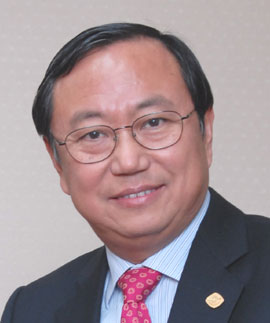
Anti-subsidy, anti-dumping probes often abused, says trade promoter
As the world economy weakens and Chinese exports lose steam, China is strongly against protectionism, firmly promoting free trade and investment, said China's top trade promoter.
"Trade protectionism is shortsighted and narrow-minded, and it cannot fundamentally address the problems of unemployment and economic growth worldwide," Wan Jifei, president of the China Council for the Promotion of International Trade, told China Daily. "Free trade is the engine of national economic growth."
 |
|
Wan Jifei, president of the China Council for the Promotion of International Trade |
Wan's comments came amid signs of a severe challenge facing China's exports in a slowing world economy, beset by the problems of waning growth and the European debt crisis.
Since late last year, China's year-on-year export growth has slowed each month. According to the General Administration of Customs, exports were up just 4.9 percent in April at $163.25 billion. Overseas shipments actually fell month-on-month, by 8.9 percent.
Shipment growth to the United States slowed to 10 percent in April from 14 percent in March, and exports to the European Union fell 2.4 percent, after contracting 3.1 percent in March.
China's exports are also under pressure from rising protectionism in developed and developing nations that have high unemployment, huge debts and low growth.
During the first 11 months of last year, there were 58 trade remedy cases launched worldwide against China.
"Trade protectionism of various types will further intensify, hurting Chinese exports," said Bi Jiyao, deputy director of the Foreign Economic Research Institute of the National Development and Reform Commission.
Wan said a big concern is that "measures including anti-dumping and anti-subsidy (probes) are frequently abused worldwide, and more and more trade conflicts are easily politicized.
"Only free, liberalized and fair international trade and investment cooperation can help expand the market scale, creating jobs and sustaining global economic growth," Wan said.
Debt and austerity drove joblessness in the 17-country eurozone to 10.9 percent in March, the highest since the euro was launched in 1999. In 2011, the EU initiated five trade remedy cases against Chinese imports.
Trade frictions between China and developed economies are set to intensify. In March, the EU joined the US and Japan in going to the World Trade Organization with questions about China's quotas on exports of rare earths, the 17 elements used in many high-tech industries.
"The negative impact of spreading trade protectionism on the world economy is beginning to emerge," said Wan.
Last year, global commodity trade volume fell 8.8 percent.
China's policymakers are worried about a broad-based slowdown that goes beyond trade.
Industrial activity, retail spending and fixed-asset investment for April were all weaker than predicted. Industrial output grew just 9.3 percent, the slowest in three years. Growth in fixed-asset investment was 20.2 percent, and that of retail sales was 14.1 percent.
Government officials have continued to state that China will act to stabilize exports, which have driven the economy during the past three decades.
They emphasized that exports are vital to job creation, even as the nation aims to transform its economic growth model to one driven by domestic consumption.
Experts and officials said the second quarter will be hard for Chinese exports, but they were confident of 10 percent growth in overseas shipments this year.
Wan's calls for "free trade" also come as the council marks its 60th anniversary this month. As the largest trade promotion institution, the CCPIT is committed to "connecting China and the world in trade", said Wan.
"Our job will be helping China balance trade, implement the 'go overseas' strategy and adjust the industrial structure", also part of the 12th Five-Year Plan (2011-15), he said.